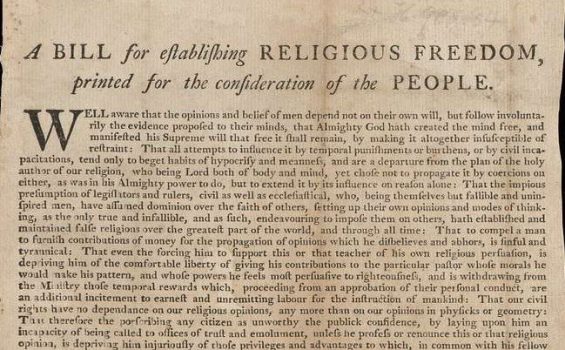
Thursday is Religious Freedom Day, which commemorates the passage of the Virginia Statute for Religious Freedom on Jan. 16, 1786. This legislation, drafted by Thomas Jefferson, became a model for the religion clauses of the First Amendment.
The Virginia Statute did two things: It ended the Anglican Church’s status as Virginia’s official church, and it codified to all residents the right to align with whatever religion (or none) as they saw fit.
It’s important to recognize that the new law protected all religions. As Jefferson noted many years later, efforts to restrict its provisions to Christian faiths failed. As a result, Jefferson observed, the law protected “the Jew and the Gentile, the Christian and Mahometan, the Hindoo, and Infidel of every denomination.”
The statute’s two provisions – no established church and freedom of religion for all – resurfaced in our First Amendment, which was drafted primarily by Jefferson’s friend and ally James Madison.
Legal scholars sometimes talk about “tension” between those two provisions. But understood properly, the provisions complement one another and don’t clash. Jefferson and Madison understood that people cannot be free if they are forced to live under the iron heel of a state-established church or if they are required to pay taxes to support faiths that are not their own. They also knew that an affirmative guarantee of religious freedom was essential. (As a young man, Madison was infuriated when he saw Baptist preachers in jail for no other reason than they had dared to disseminate their doctrines in public.)
The idea behind the Virginia Statute and the First Amendment it inspired, then, seems pretty simple: No coerced support for religion by an official church and a guarantee of the right to choose your own religion (or none).
That’s the essence of religious freedom. Yet today, the Supreme Court and its Christian Nationalist allies are attempting to foist a mutated version of religious freedom on the country. Under this new version, which has no support in our history or traditions, religious freedom becomes a device to discriminate against others, treat certain groups of people like second-class citizens and for some religious groups and individuals to ignore secular laws that everyone else must follow – even if their actions cause harm to others.
On Thursday, take some time to celebrate the wisdom of the founders who gave us religious freedom backed by the separation of church and state. But do more: Acknowledge that this vision is under attack and vow to defend it.
P.S. AU is leading a national recommitment to keep church and state separate. You can be part of the movement by discussing the importance of church-state separation with your friends and family and sharing some AU resources with them. Start with this guide, which explains how the Constitution protects religious freedom and debunks Christian Nationalist misinformation.